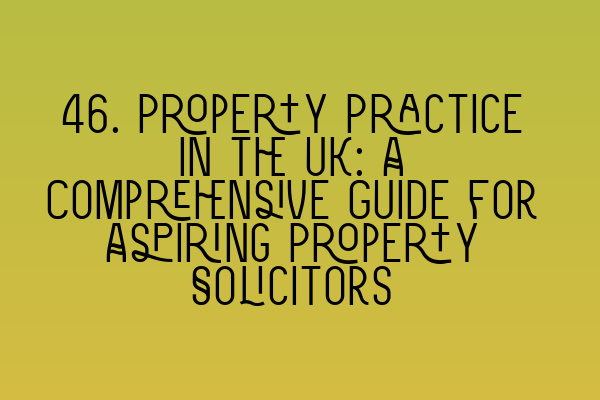46. Property Practice in the UK: A Comprehensive Guide for Aspiring Property Solicitors
Welcome to SQE Property Law & Land Law, where we provide expert advice and guidance on all aspects of property practice in the UK. Whether you are an aspiring property solicitor or a seasoned professional looking to enhance your knowledge, this comprehensive guide will provide you with the necessary information to navigate the complex world of property law with confidence.
1. Introduction to Property Practice
Property practice encompasses a wide range of legal areas, including residential and commercial conveyancing, landlord and tenant law, planning and development, and property disputes. As a property solicitor, you will be responsible for advising clients on buying, selling, and leasing properties, resolving disputes, and ensuring compliance with relevant laws and regulations.
To excel in property practice, you need a strong foundation in both theoretical knowledge and practical skills. This guide will cover essential topics such as property rights, legal frameworks, key legislation, and procedural requirements.
2. Understanding Property Rights
Property rights form the foundation of property law in the UK. It is crucial to have a clear understanding of the different types of property rights, including freehold, leasehold, and commonhold. Our guide will explore these concepts in detail, examining their legal implications and practical considerations.
Related Article: SQE 1 Practice Exam Questions
3. Residential Conveyancing
Residential conveyancing is a vital aspect of property practice. From the initial stages of drafting contracts and conducting searches to the final completion of the transaction, it requires meticulous attention to detail and a deep understanding of legal requirements. Our guide will walk you through the residential conveyancing process, highlighting key considerations and best practices.
4. Commercial Conveyancing
Commercial conveyancing involves the transfer of property used for commercial purposes, such as offices, retail spaces, and industrial units. This area of property practice requires a broader skillset, as you will need to navigate complex lease agreements, assess environmental risks, and advise on business-related considerations. Our guide will delve into the intricacies of commercial conveyancing, providing valuable insights and practical tips.
5. Landlord and Tenant Law
Landlord and tenant law governs the relationship between property owners and tenants. As a property solicitor, you will often be called upon to assist clients with lease negotiations, rent reviews, eviction proceedings, and dispute resolution. Our guide will cover the key principles of landlord and tenant law, equipping you with the knowledge and tools necessary to effectively represent your clients’ interests.
6. Planning and Development
The planning and development process is a crucial aspect of property practice, ensuring that buildings and land use are in line with zoning regulations and sustainability objectives. This section of our guide will explore topics such as planning permission, environmental impact assessments, and appeals processes, arming you with the information needed to guide clients through the planning and development maze.
7. Property Disputes
Property disputes are an inevitable part of property practice. Whether they involve boundary disputes, nuisance claims, or breaches of contract, resolving these conflicts requires a thorough understanding of property law and dispute resolution mechanisms. Our guide will equip you with the skills necessary to navigate property disputes efficiently and effectively.
Related Article: SQE 2 Preparation Courses
8. Professional Ethics and Regulatory Framework
As a property solicitor, it is essential to adhere to the highest standards of professional ethics and comply with the regulatory framework set out by the Solicitors Regulation Authority (SRA). This section of our guide will explore the ethical obligations and responsibilities of property solicitors, ensuring that you are equipped to navigate the legal and ethical challenges encountered in your practice.
Conclusion
Property practice in the UK is a dynamic and multifaceted field, requiring a comprehensive understanding of property rights, legal frameworks, and procedural requirements. By mastering the key concepts and practical skills outlined in this guide, aspiring property solicitors can embark on a successful and fulfilling career in property law.
If you’re looking to prepare for the SQE exams and enhance your property law knowledge, check out our SQE 1 Preparation Courses and SQE 2 Preparation Courses for expert guidance and practice materials.
Stay updated on SRA SQE Exam Dates to ensure you are on track for success.
